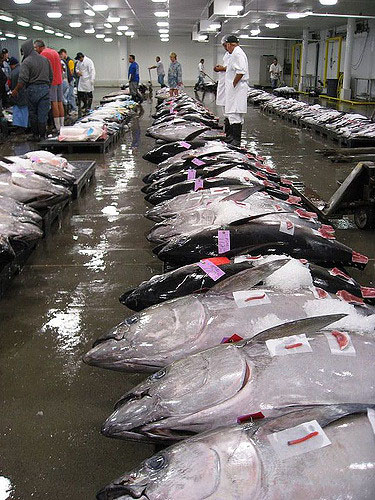Two Indonesian fishermen who claim they escaped slavery aboard a Honolulu-based fishing vessel are now suing the boat’s owner for keeping them confined to the boat under what they say were dangerous working conditions.
Fresh fish on display at the Honolulu Fish Auction. The auction house has said it will not do business with boats who refuse to adopt a new labor contract aimed at eliminating forced labor. Creative Commons photo by _e.t.An Associated Press reporting team investigating labor abuse in the fishing industry recently revealed hundreds of undocumented men catching swordfish and ahi tuna in a Hawaii fleet. Most of them are from Southeast Asian and Pacific nations and are paid as little as 70 cents an hour.
Hawaii’s fishing industry is known for being tightly regulated, but a federal loophole exempts commercial fishing boat owners in the state from certain labor laws. The workers typically sign two- or three-year contracts with a fishing vessel and are at the mercy of American captains. They have no legal standing on U.S. soil, and the captain or owner of the vessel holds any legal documents once they step onboard. (Read NF Editor Jessica Hathaway’s editorial “Aloha again.”)
The skilled fishermen are paid less than minimum wage, but still more than they can make in their home countries, so they give up their freedom of movement for money. According to the report, bait and ice expenses cost more than crew salaries on these boats.
In the original story, AP reporters interviewed fishermen Abdul Fatah and Sorihin, who uses one name, about their experiences. They both arrived seven years ago and were put to work on the Sea Queen II.
Now the pair – who have since been issued visas for victims of human trafficking and are living in the San Francisco area – have filed a lawsuit in federal court saying they were unaware that they would never be allowed on U.S. soil when they signed their contracts. The lawsuit alleges that Thoai Nguyen, owner and captain of the vessel, denied them medical treatment and demanded an impossibly high fee to break their contracts.
The AP story described Sorihin having his finger nearly ripped off by a fishing line and the captain making him a makeshift splint with a chopstick. In another incident, a winch cable snapped and bruised his shoulder. That time he was allowed a two-hour break.
The fishermen are suing for payments for debts the men incurred and unspecified damages for “mental anguish and pain.”
“I want to be compensated because of the suffering I felt on the boat and all the suffering I have endured after I got off the boat,” Sorihin said Thursday through a translator at his lawyer’s San Francisco office, according to AP reports. “And I hope no one will suffer what I have suffered.”
Investigators tracked seafood caught on these boats to restaurants to seafood counters at Whole Foods and Costco across the country and wrote that anyone buying Hawaiian seafood is certainly eating fish caught by one of these undocumented workers.
State and federal lawmakers vowed to improve conditions for these workers since the story was published. Meanwhile, the Honolulu Fish Auction declared that as of Oct. 1 it would only sell fish from boats that use a new standardized contract aimed at eliminating forced labor.







